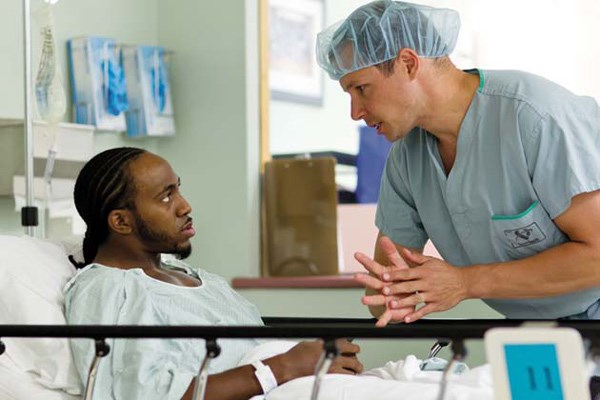As far as B.C. Lions player Stanley Franks is concerned, there's a long list of people to thank for the fact that he still has his leg - and almost all of them work at Royal Columbian Hospital in New Westminster.
"Everyone, from the nurses to the doctors - everyone, they did a great job," Franks told The Record from his hometown of Long Beach, California, where he's in long-term rehabilitation in hopes that he may be able to return to his pro ball career.
In the meantime, whether he can play again or not, he's grateful for the fact that he has the leg that doctors initially thought might have to be amputated after a devastating injury.
INJURY ON THE FIELD
Injuries are nothing new to professional athletes - from concussions to sprained ankles and everything in between, injury is just a fact of life for those who make their living in sports.
And for those in football, one of the most rough contact sports there is, the risks go way up.
But Franks' injury was something worse than the typical sports-related injury.
On July 8 - just a day after he'd turned 25 - he dislocated his left knee during a game with the Calgary Stampeders.
"Basically, I stepped on the receiver's foot, going full speed - the impact hyperextended my knee . and I went down," he said. "I was conscious, but I was in shock more than anything. I was in a massive (amount of) pain."
The team's doctor quickly realized the injury was significant: he couldn't detect a pulse in Franks' foot. The 180-pound athlete was rushed to Royal Columbian Hospital.
Dr. Kamyar Kazemi was waiting to perform emergency surgery - but Franks was told there was a chance he could wake up without a leg.
The main artery had been torn, and the damage was so bad it could result in an amputation to save his life.
"It was pretty much disbelief. Just to go from living a normal life to a possible amputation - that's when it changed my life, to know that could happen," he said.
Franks was put under for the surgery and, when he woke, immediately reached down to discover his leg was still there. His uncle, sitting in a corner of the recovery room, smiled at him.
"That was the most relieving moment," he said.
In a four-hour surgery, Kazemi had been able to transplant a vein below Franks' knee to allow the blood to flow again.
The leg was saved, but that was just the beginning.
MORE SURGERY
While that initial surgery saved his leg, the damage to the knee still needed significant repair.
Four weeks after the injury, Franks went back in for surgery with RCH's Dr. Darius Viskontas, one of only a handful of surgeons in the province able to do the intricate procedure.
"We needed to reconstruct one of the ligaments on the inside of the knee, called the ACL, and we had to reconstruct (ligaments) on the posterolateral corner," he told The Record.
"We see (this type of surgery) fairly commonly here - we get referred most of these injuries, probably five to 10 per year, for this specific type of procedure."
Most injuries of this type, he says, are caused by motor vehicle accidents.
Using donor tendons - which come frozen from the U.S. and are kept in the hospital's tissue bank - Viskontas was able to repair the damage with the help of a team of doctors, nurses and anesthesiologists.
The "new" knee works, but whether or not Franks will be able to play professionally is still unknown.
"The knee is never normal after this - some people go back to sports, but it's typically always a bit looser than the other knee," said Viskontas.
"The advantage for Stanley is that he has resources for a very high level of rehabilitation."
When asked what he thought about working on a high-profile patient, Viskontas said medical professionals simply see a patient who needs help. "We're just trying to provide the best care we can."
THE ROAD AHEAD
Watching the B.C. Lions win the Grey Cup was bittersweet for Franks, who should have been on the field as a player during the historic game. And though there's a chance he won't return to professional football, he's grateful to simply have the chance to try.
"Seeing the success, the championship, it was great - it helped to see them win," he said. "For me, in my situation, going from playing on the field one minute, to 'You might not have a leg' - that's pretty unreal. I'm glad to have my leg."
Franks says the team at RCH, along with the B.C. Lions' medical staff, are responsible for not only saving his leg, but putting him on the road to recovery.
"Everything was just on point, they did exactly what they needed to at every step. I feel very, very grateful for them," he said.
www.twitter.com/ChristinaMyersA



